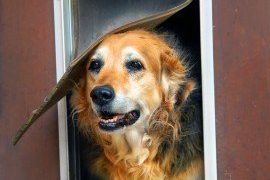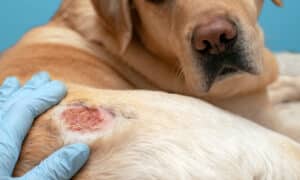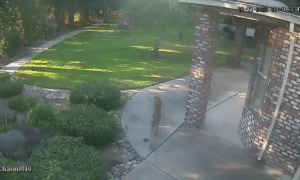“This post contains affiliate links, and I will be compensated if you make a purchase after clicking on my links.”
If you’ve ever been unfortunate to have lost a beloved dog, the thought of having him cloned may have crossed your mind. Well, as it turns out, in addition to the extremely high cost and the debate over whether cloning is even right or wrong, according to this article from ABC News, dog cloning in South Korea raises ethical red flags. There are reports of abuse, high rates of failure, and that the clones themselves may have serious health problems.
Dog Cloning in South Korea Raises Ethical Red Flags
Three years after losing her beloved dog, Trouble, the love of Danielle Tarantola’s life returned from the dead.
A new puppy she named Double Trouble is an exact genetic replica of the original, developed in a petri dish by South Korean scientists in what has become a growing, high-tech and highly-controversial, industry of dog cloning.
Cloning first entered public debate in 1996, when researchers at the Roslin Institute in Scotland successfully produced Dolly the sheep, the world’s first cloned mammal. Dolly opened the door for researchers across the globe to attempt to clone other animals, and there have since been successful horse, deer, cattle, dog and cat clones.
However, the laboratory environment in which these clones are developed, the surrogate mother animals who are charged with carrying the embryo clones to term, and the resulting multiple clones that sometimes have deformities are just some of the animal welfare red flags bioethicists raise with animal cloning.
Tarantola’s journey to get Double Trouble started when she was 18 and she got a lovable mutt she named Trouble. She was so enamored with her new puppy, she painted Trouble’s face on a wall in her house, printed his face on her pillows and on her bedspread, and dressed him up in an elaborate costumes.
“When I got married … I had him in a tuxedo,” Tarantola said. “I loved him to death. I couldn’t, no, I probably did love him more than some people who were involved in my life.”
Trouble died when he was nearly 18 years old, and Tarantola was crushed.
“He was like my baby,” she said. “I didn’t have children, so he was basically like my son. It was terrible. It was heartbreaking.”
It was then that she reached out to an animal cloning company in South Korea and the only place in the world where people can have their dogs cloned.
The cost: $100,000.
At the time, Tarantola had recently lost her job on Wall Street and convinced the company to let her pay $50,000 instead because her journey was being chronicled by TLC for an upcoming hour-long special, “I Cloned My Pet,” which airs on Jan. 11 at 9 p.m. ET.
“I was willing to do it for $100,000,” Tarantola said. “I got a deal.”
A few months ago, Tarantola got a phone call from the company’s scientists, who informed her that the surrogate mother dog carrying the embryos developed from Trouble’s DNA was successfully impregnated. Weeks later, the surrogate went into labor in the middle of the night, and Tarantola watched the birth over Skype.
But not all clients are so lucky. Quite often, the clones do not survive because of abnormalities or multiple clones are successfully birthed and the client only wants one dog — but those are just part of the reason the dog cloning business is so fiercely controversial.
John Woestendiek, the author of “Dog, Inc.,” a book about the dog cloning industry, said the practice is based in South Korea because it’s a country with much lower ethical standards for the treatment of dogs than is the United States.
“You can rent [dogs] from farmers for the laboratory and, hopefully, everything goes OK, return them to the farmer, but everything’s not going to go OK,” Woestendiek said.
Woestendiek said some of the dogs used in the cloning process as egg donors or surrogate mothers are later sent back to the farms where they are killed and eaten. In South Korea, dogs are raised on farms for their meat.
Tarantola said she inquired about the treatment of the surrogate mom dog that carried Double Trouble to term when she paid the firm.
“I wouldn’t sacrifice one dog for another,” she said. “In no way, not even to get what I wanted, would I do that.”
The firm told Tarantola and ABC News that the surrogate used, as well as all of their surrogates, are sent to a “nice farm” to live, but Woestendiek was skeptical.
“It sort of sounds like, you know, what you tell your kids when the dog dies: ‘He’s gone off to this lovely little farm,'” he said.
Woestendiek is also concerned not just with the industry but that cloning dogs puts mankind on a slippery slope towards human cloning.
“That’s one of the things that initially intrigued me, the first time we were cloning a loved one — that it’s the closest to man we’re come to cloning man, by most accounts and that once we’ve cloned man’s best friend, how far behind might man be?” he said.
Tarantola’s focus remained on the little clone puppy that arrived at her New York City home just a few weeks ago.
“I looked in the little case [Double Trouble] was in, and I was looking at his face, and I said, I couldn’t believe it,” she said. “It’s amazing. Everything is the same. Even the personality is the same. What Trouble used to do, [Double Trouble] does.”
Although she admitted having her “old” dog back as a clone was “weird,” Tarantola was thrilled to have this new puppy.
“I do know Trouble is gone, the original Trouble,” she said. “But I do feel like [Double Trouble is] so much, he looks like him and the personality, everything is exactly the same, that it’s like having the same dog over again.”
While Tarantola is convinced that this new Trouble is similar to the old beloved friend, the truth is, Woestendiek said, there is no guarantee that will be the case with these cloned dogs.
“You’re not really getting your dog come back to life,” he said. “You’re getting a genetic duplicate or twin, and we know how different twins can be. I mean, what’s special about your dog, that’s the part that can’t be cloned. In effect, the person who is getting a dog clone is paying $100,000 to get a blank canvas.”
Despite the criticism, Tarantola is undeterred. In the process of making Double Trouble, another clone also survived and will arrive at her house in a few weeks. She said she is thinking about naming him Triple Trouble.
You can read the full article here. Now that you’re aware that dog cloning in South Korea raises ethical red flags, how do you feel about it? Would you consider cloning your four-legged friend? We’d love to hear your thoughts. Use the comment box below.


















This might have had something to do with not meeting my weight loss goal.
Some easy practices and dietary changes can make you slimmer and beautiful than ever before.
Once the pictures have been taken it displays all of the pictures in one image.